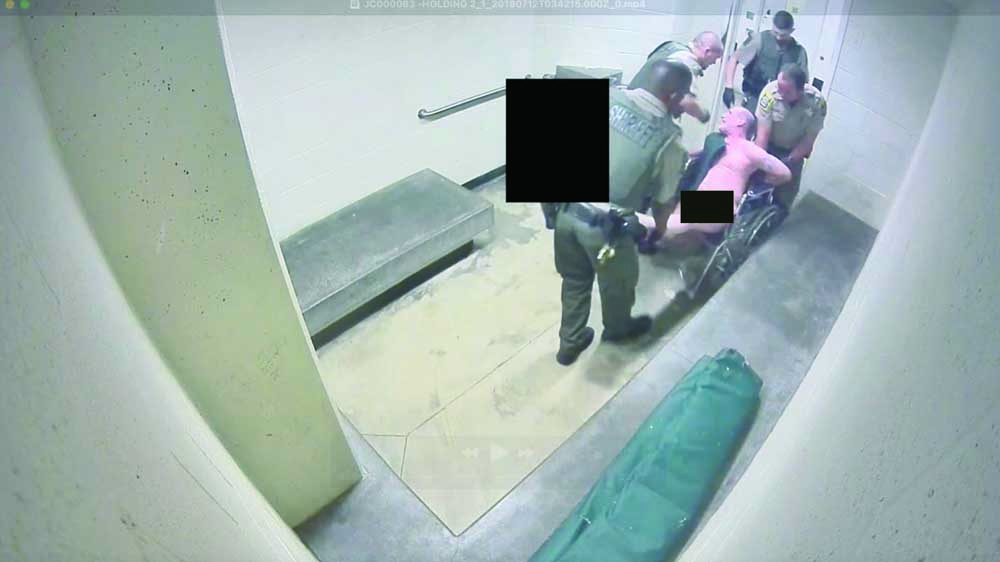Judge affirms findings in Jackson County Jail ‘slap’ suit, clearing way for jury trial
Published 2:45 pm Monday, September 23, 2024

- A federal judge denied the county's objections and affirmed an earlier judge's opinion on claims filed against the Jackson County Jail by John Lee Malaer, who claims jail staff failed to accommodate for his medical needs and that he was battered by corrections deputies on July 11, 2019.
A federal judge last week denied Jackson County’s objections and wholly affirmed an earlier judge’s findings in a civil rights suit filed by a paraplegic man who claims he was mistreated in the county jail.
U.S. District Judge Michael McShane’s Sept. 18 opinion and order clears the case filed by John Lee Malaer for a trial in which jurors, among other disputed facts, will decide whether a corrections deputy’s slap caught on camera stemmed from “policy or informal custom.”
In July, U.S. Magistrate Judge Mark D. Clarke denied the county’s request for summary judgment in Malaer’s case, which is based on claims the county failed to accommodate for his medical needs and that he was battered by corrections deputies.
Malaer claimed in his suit first filed in early 2020 that he was separated from medication and catheters needed to treat his neurogenic bladder condition when Medford police arrested him on July 11, 2019. He claims that caused him at the jail to urinate on himself and his bedding, and that being without a wheelchair for roughly five hours left him severely dehydrated. With no access to the faucet, Malaer claims he was forced to drink water from the toilet.
His claims against Medford police were severed into a separate case in 2021.
Another portion of Clarke’s findings and recommendation focused on an alleged excessive force incident involving Malaer and Corrections Deputy Brian Kolkemo.
County defendants, including Kolkemo, claim that that the open-handed slap in the clothing exchange room was a “diversionary strike.” Malaer, however, seeks to argue that not only was it excessive force, it qualifies for what is known as a Monell claim — meaning that the strike he endured stemmed from county policy, procedure or internal custom, and thus the county would be liable.
The county filed an objection to Clarke’s findings and recommendation on Aug. 14. The objection was sealed in court records, but McShane’s latest opinion and order summarizes the county’s arguments before denying them.
“I find no error and conclude the report is correct,” McShane ruled.
The county’s objections include an argument that Malaer’s claims should be barred by the statute of limitations — which Clarke had denied in an earlier ruling and McShane affirmed — and that Malaer failed to give the county proper notice under the Oregon Tort Claims Act when he sent written notice to Medford’s city manager on July 27, 2019.
McShane noted that Sheriff Nathan Sickler messaged one of his lieutenants about the incident three days after the Medford city manager was notified: “This incident involves a Use of Force and occurred while the deputy was on duty and acting in his capacity as a sheriff’s deputy.”
McShane cited the message as sufficient to show that the county had “actual and timely notice,” the order states.
The county also objected on grounds related to Malaer’s Americans with Disabilities Act claims, arguing that there is “nothing in the record” to demonstrate that Malaer suffered a particularized injury related to his ADA claims, or that “there is a question of fact as to indifference.”
McShane found that Malaer’s claims that he experienced seizures and bladder spasms on a concrete jail cell without access to clothing, a toilet or drinking water “is sufficient to show particularized injury.”
Further, Malaer’s allegations that he was forced to drink water from the toilet and had to drag himself around on the concrete floor naked are “sufficient to show a genuine issue of material fact about whether (county) defendants acted with deliberate indifference,” McShane wrote.
McShane’s opinion and order gives Malaer’s lawyers and the county 30 days from Sept. 18 to decide whether the jury trial should come before Magistrate Judge Clarke.
“In the absence of full consent, the case will be reassigned to Judge McShane and set for trial,” McShane’s order states.










